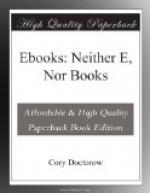* Liability goes through the roof. Copyright infringement, especially on the Net, is a supercrime. It carries penalties of $150,000 per infringement, and aggrieved rights-holders and their representatives have all kinds of special powers, like the ability to force an ISP to turn over your personal information before showing evidence of your alleged infringement to a judge. This means that anyone who suspects that he might be on the wrong side of copyright law is going to be terribly risk-averse: publishers non-negotiably force their authors to indemnify them from infringement claims and go one better, forcing writers to prove that they have “cleared” any material they quote, even in the case of brief fair-use quotations, like song-titles at the opening of chapters. The result is that authors end up assuming potentially life-destroying liability, are chilled from quoting material around them, and are scared off of public domain texts because an honest mistake about the public-domain status of a work carries such a terrible price.
* Posterity vanishes. In the Eldred v. Ashcroft Supreme Court hearing last year, the court found that 98 percent of the works in copyright are no longer earning money for anyone, but that figuring out who these old works belong to with the degree of certainty that you’d want when one mistake means total economic apocalypse would cost more than you could ever possibly earn on them. That means that 98 percent of works will largely expire long before the copyright on them does. Today, the names of science fiction’s ancestral founders — Mary Shelley, Arthur Conan Doyle, Edgar Allan Poe, Jules Verne, HG Wells — are still known, their work still a part of the discourse. Their spiritual descendants from Hugo Gernsback onward may not be so lucky — if their work continues to be “protected” by copyright, it might just vanish from the face of the earth before it reverts to the public domain.
This isn’t to say that copyright is bad, but that there’s such a thing as good copyright and bad copyright, and that sometimes, too much good copyright is a bad thing. It’s like chilis in soup: a little goes a long way, and too much spoils the broth.
From the Luther Bible to the first phonorecords, from radio to the pulps, from cable to MP3, the world has shown that its first preference for new media is its “democratic-ness” — the ease with which it can reproduced.
(And please, before we get any farther, forget all that business about how the Internet’s copying model is more disruptive than the technologies that proceeded it. For Christ’s sake, the Vaudeville performers who sued Marconi for inventing the radio had to go from a regime where they had one hundred percent control over who could get into the theater and hear them perform to a regime where they had zero percent control over who could build or acquire a radio and tune into a recording of them performing. For that matter, look at the difference between a monkish Bible and a Luther Bible — next to that phase-change, Napster is peanuts)




